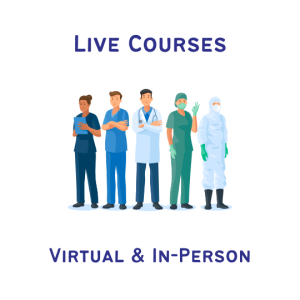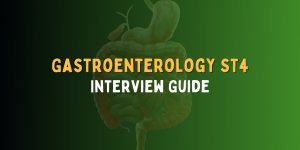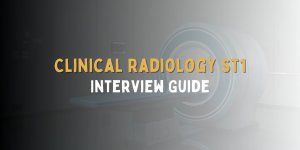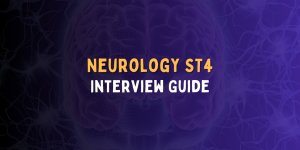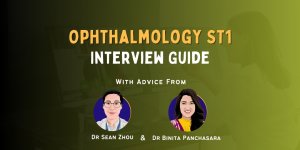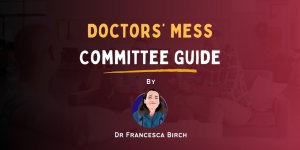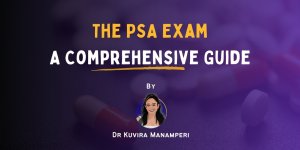
Published January 13, 2023 | Updated April 30, 2024
By Myra Safdar
An IMG who bought the NHS dream thanks to a childhood obsession with Harry Potter. Myra currently juggles various roles as a junior doctor, freelance writer, and medical curator at an American medical education startup.
During your med school days, you might have assumed that any discussion about the MRCP Part 1 Examination was regarding Magnetic Resonance Cholangiopancreatography, a fancy imaging test for the bile and pancreatic ducts. But as UK medical school graduate, you would have soon learned this is something entirely different.
What are the MRCP Exams?
The MRCP exam is a three-part series of exams undertaken by junior doctors working in internal medicine in the UK. The qualification is recognised and examined by the three major Royal Colleges for physicians:
- Royal College of Physicians of London
- Royal College of Physicians of Edinburgh
- Royal College of Physicians and Surgeons of Glasgow
The examinations cover the essential knowledge and skills needed for doctors in Internal Medicine Training in the UK, and passing means you are awarded the Membership of the Royal Colleges of Physicians of the United Kingdom Diploma. You need to complete all parts of the exam to be able to apply for higher speciality medical training.
MRCP(UK) Part 1 is the first examination of the series, which also includes the Part 2 Written and PACES exams. To qualify, you need to have at least a minimum of 12 months of postgraduate medical experience. This means that you need to be done with your FY1 year before you can sit for the exam.
It should be noted here that the exams are not just taken by UK medical graduates. Some international medical doctors might also be interested in the Membership of the Royal Colleges of Physicians diploma as this can make their CV more competitive, boosting IMT application and interview scores.
In this guide, we will talk you through the Part 1 exam. We will give you the lowdown on how part 1 works, and give you all of the key information you need to plan.
What is the MRCP Part 1 Exam
MRCP Part 1 is considered to be a notoriously difficult examination. Despite the reputation, passing is very doable if you stay disciplined and plan your revision properly. Before you get started with revision, it might be helpful to get a general overview of the exam format.
The exam consists of two papers of 100 multiple-choice questions each. You will be given three hours for each paper. Each correct answer is awarded one mark but there is no negative marking for any incorrect answer.
The medical knowledge tested in part 1 is usually at a higher level than what you might be used to from your med school finals. This is because examiners expect you to have expanded your knowledge base during your work as a doctor.
You should check out the blueprint for the exam as not all specialities are treated equally. The blueprint can help you structure your revision plan.
MRCP Part 1 Question Format
Questions usually consist of clinical scenarios that test your ability to diagnose, manage and interpret clinical situations that you might encounter while working as a trainee in general medicine.
The questions will give you limited background information, which may or may not include:
You will then be asked to answer a question based on this information, choosing from 5 answers. Each subspecialty of medicine is represented in Part 1, with some specialities represented more than others. The exact number per speciality changes for each examination, but here are the assumed numbers:
| Speciality | Likely number of questions |
|---|---|
| Cardiology | 14 |
| Clinical Pharmacology & Therapeutics | 15 |
| Clinical Sciences | 25 |
| Dermatology | 8 |
| Endocrinology, Diabetes, and Metabolic Medicine | 14 |
| Gastroenterology and Hepatology | 14 |
| Geriatric Medicine | 8 |
| Haematology | 10 |
| Infectious Diseases | 14 |
| Neurology | 14 |
| Oncology | 5 |
| Medical Ophthalmology | 4 |
| Palliative Medicine and End of Life Care | 4 |
| Psychiatry | 9 |
| Renal Medicine | 14 |
| Respiratory Medicine | 14 |
| Rheumatology | 14 |
| Total | 200 (100 per paper) |
When revising, it’s important that you have a handle on which specialities are more important to revise. The most common type of question is on clinical sciences, which is made up of several topics:
- Cell, molecular and membrane biology
- Clinical anatomy
- Clinical biochemistry and metabolism
- Clinical physiology
- Genetics
- Immunology
- Statistics, epidemiology and evidence-based medicine
To help you prioritise your revision better, we’ve put together a chart representing the percentage of questions in each speciality.

MRCP Part 1 Trigger Words
The questions and answers may contain “trigger words”, which are important to identify. These words can be very subtle, but often change the meaning of a question or answer.
For example, you might be given information on a patient who has been admitted to the Emergency Department with investigations consistent with a diagnosis of Diabetic Ketoacidosis, with the question:
“What is the most important initial treatment?”
- A – Fixed Rate Insulin Infusion (e.g. 50 units human soluble insulin in 50ml 0.9% sodium chloride)
- B – Subcutaneous injection of short-acting insulin
- C – 10% dextrose 125ml/hr once glucose falls below 14 mmol/L
- D – 1000ml 0.9% sodium chloride (plus 40mmol/L KCL if potassium level ≤ 5.5) infusion over 60 minutes
- E – Increase long-acting insulin dose
Each of these answers may be an appropriate treatment for DKA, but the trigger word here is initial.
The very first treatment that should be administered for DKA is intravenous fluid resuscitation, so option D is the correct answer in this case.
Trigger Word Examples
For Questions:
- A typical feature – the answer is a feature you would expect to see in this case
- Initial – the answer is the very first thing you would do
- Most likely – the answer is the option which is statistically the most likely
- Possible – the answer is possible in some cases
- Rarely – the answer is technically possible but is unlikely
For Answers:
- Always – this option is always, without fail, the correct response
- Only – you would do this and nothing else
- Never – there is no situation in which you would do this
- Usually – this is the correct response in the majority of situations
MRCP Part 1 Exam Technique
When answering part 1 questions, if you have no clue what the correct answer is, you might be tempted to guess.
We think you should! But make an educated guess, giving yourself the best chance of passing. Guessing at random gives you a 20% chance of getting the right answer, but if you play your cards right you can increase that significantly.
MCQ answers for part 1 are usually made up of:
- 1 Correct answer
- 1 Incorrect answer, which is similar to the correct answer
- 2 Incorrect answers which you can identify as wrong if you have some knowledge on the subject
- 1 Generally obvious incorrect answer
This isn’t always the case, but it gives you a way to work through the answers methodically. You are permitted to write on the question booklet for in-person exams, so try going through the paper in this manner:
- Read the question.
- Read the question again, to make sure you know exactly what it is asking, identifying trigger words and subtle negatives.
- Look through all the answers – you can give your answer at this point if you are 100% sure.
- Cross out the answer which seems obviously incorrect.
- Cross out any other answers which also seem wrong – this might be 2+ if you know the subject matter, or sometimes none at all.
- If you have eliminated all but one option, choose this answer.
- If you don’t have a clear winner, make a guess using the remaining options.
This technique seems simple, but it allows you to improve your chances when making a guess by eliminating wrong answers first rather than guessing at random.
| Options Eliminated | Rough Chance of Correct Guess |
|---|---|
| None | 20% |
| 1 Option | 25% |
| 2 Options | 33% |
| 3 Options | 50% |
How To Apply For MRCP Part 1
Once you have decided to sit the part 1 examination, you should register for the exam on the MRCP UK website.
Step 1 – Make an Account
To apply for the part 1 examination, you will first need to set up an online account on the official website. Avoid making multiple accounts as this can delay your application process.
During the account set-up process, you will be asked to provide your personal details and GMC registration status. Once you have established an account and applied for the exam, you will be allocated a unique RCP number. You should use this unique RCP number in all of your future correspondence with the royal colleges.
Step 2 – Update Your Professional Details
After your My MRCP(UK) account has been established, log into your account. Make sure that all of your personal details are correct. In order to complete the application, you will need to provide your correspondence address.
For the exam application, you will be asked to provide evidence of your primary medical qualification (PMQ). This is the medical degree awarded by your medical school, such as the MBChB, MBBS, or MD certificate.
International applicants need to ensure that the university or medical school from which they gained their primary medical degree is listed in the WHO’s World Directory of Medical Schools.
You will need to fill in details about whether you are currently in a training position in the UK or not.
Step 3 – Book Your Exam
Once you have provided all the relevant details, you will be asked to select the examination centre that would be most convenient for you.
At this point, you can also request any special arrangements that you might require for the exam. These usually include any physical disabilities or learning difficulties that might require special arrangements on the day.
At the end of the application, you can pay for the exam using either a debit or a credit card. The fee varies depending on whether you’re taking the exam inside or outside the UK:
- UK held Part 1 Exam Fee – £460
- International held Part 1 Exam Fee – £616
Note that the application process and fee for the Hong Kong centre are different. If you’re an applicant from Hong Kong, you can check out the details on the website.
Optional – Online Format for the Exam
In 2020, the RCP introduced an online version of the part 1 examination to facilitate the candidates during the COVID-19 pandemic.
You will need a webcam-supported laptop or PC as you will be recorded during the exam.
Unfortunately, the option to book an online examination is available only to candidates based in the UK and the Republic of Ireland. International applicants will need to sit for an in-person exam in their local centres.
Revising for MRCP Part 1
Part 1 is usually the first exam taken after graduation for those interested in IMT. If you’ve been working for a while, part 1 revision on a full-time rota might seem like a mammoth task!
Studying as a fully-qualified doctor is very different from your previous experiences. As a medical student, you most likely didn’t have to worry about getting study leave or managing revision with a full-time rota. However, the reality of working as a junior doctor is that you need to be very efficient with your time.
While it may not always be possible to get a sizable chunk of time for revision during the day, being consistent and setting an achievable daily goal can help you manage your time more efficiently.
Some choose to take this during their FY3 year or while working abroad, which helps give you more flexibility in your revision time.
MRCP part 1 is notorious for asking about weird and wonderful conditions, and Part 1 is known for its emphasis on clinical theory and basic science. For this reason, you cannot rely on knowledge you have gleaned from your day-to-day learning on ward rounds and clinics.
Question Banks for MRCP Part 1
Question banks are the holy grail for Part 1 revision. You should be cautious about sitting for the exam unless you have completed the question bank. of your choice at least once. A major aim of the revision is to gain an understanding of the exam format, and nothing prepares you for it better than good old MCQ banks.
MRCP part 1 question banks simulate the exam format and can help you to improve your clinical decision-making and examination skills. The real thing might not be identical in format or content, but question banks help you prepare for the main themes and concepts that are commonly tested.
Solving multiple-choice questions repeatedly will help you to identify recurring themes and solidify basic concepts. In the end, whichever question bank you end up choosing for your preparation, make sure you utilise active learning techniques. Thinking critically about a question and analysing the feedback can massively improve your chances of passing.
Another tip that can help during the early phase of revision is to stop agonising over your scores. Instead, think of these question banks as a learning tool. Try to actively think about the key learning point of each question. Read through the explanations thoroughly with a special focus on questions that you got wrong.
Even though a lot of question banks have popped up in the market, we have listed here the most popular question banks that most candidates have found to be useful:
MRCP Official Sample Questions
These are an absolute must! Do not miss the official sample questions provided by RCP on the official website. These questions are without a doubt the closest thing you will get to the real examination. Currently, there are 197 questions available, which come with explanations of the correct answer. These sample questions will help you get a feel of the actual exam.
It is recommended that you should try taking these mock exams closer to your date, though you can also give it a go right at the start of your revision to get your head around the right level of difficulty.
PasTest
PasTest is the other big name in exam revision among UK medics, with many junior doctors choosing to subscribe to both the Passmedicine and PasTest question banks. The PasTest MRCP Part 1 question bank is on the pricier side, with subscription prices ranging from £85 to £170.
PasTest has a larger pool of about 7400+ best-of-five questions. These questions cover a wide range of topics and specialities tested in the part 1. PasTest also has an app whereby you can download batches of questions, meaning you can study on your phone or tablet even if you’re stuck in the basement of a hospital with no signal.
After each sitting, PasTest pays candidates to discuss the main themes (though not the specific questions, as this is prohibited by the RCP). Some people, therefore, believe that the PasTest question bank is closer to the actual exam and is therefore worth the extra cost.
Even if you don’t manage to finish the entire question bank, the past paper section is extremely useful for part 1 preparation.
Quesmed MRCP Part 1 Qbank
Quesmed is a new name in the Qbank space for post-graduate exams, but the company has made a name for itself by helping med students pass their finals. Their platform is now fully kitted out with features such as an offline iOS/Android app, a complete MRCP textbook, and integrated progress tracking.
What’s even better is you can start for free!
With almost 5000 MRCP part 1 questions and a middle-of-the-road price of £64.99 per 3 months, this might be a good alternative to PasTest/Passmed, or a useful offline revision resource for when you’re stuck in a signal-less doctors’ mess.
Use our promo code MEDCOURSE15 for 15% off your subscription (and help us pay our bills!).
Passmedicine
Passmedicine is regarded as a ‘gold standard’ for part 1 preparation. If you studied in a UK medical school, this will be a familiar name; you might have used it for med school finals.
The Passmedicine brand has established its reputation as a budget-friendly high-quality resource for medical exams. If you’re pressed for time and think you can only manage to revise one resource, Passmedicine is a major contender.
The question bank covers all the high-yield material that you need to know for the examination, providing you with both the questions and the reasoning behind the answers. This question bank contains over 4000 questions with detailed explanations, repeating common themes a few times so that you can learn through repetition. The explanations are based on the latest NICE guidelines and are regularly updated.
The Passmedicine question bank is excellent value for money. As of 2023, a 4-month subscription to the question bank will cost you around £35. If you feel you need more time for revision, you can also get a 6-month subscription for about £45. Once you’re done with a set of questions, you can revise relevant high-yield stuff without delving deep into the detailed notes. This feature can prove to be very helpful for last-minute revision.
BMJ OnExamination
BMJ OnExamination is another question bank resource that you can consider using for your Part 1 preparation. They currently have 3190 questions in their part 1 question bank. Like the PasTest app, BMJ OnExamination comes with offline access which can be convenient for revision while on the go. Another nice feature is that you can join friends to practice questions, and can compete in the daily leaderboards. The cost of a subscription ranges from around £37.99 to £67.99.
You can try the free trial version to see if their question bank suits your learning style.

MRCP Part 1 Books
While many candidates pass part 1 just using question banks, some people might feel that they need traditional book learning. This might be especially relevant if you feel that you need to brush up on the basic principles or find that books are better suited to your learning style.
One thing that should be stressed here is that reading a book cover to cover may not help you prepare effectively. However, you can utilise a textbook as a general reference to look up any topic that you feel you need to read about in detail.
Many candidates use PDF notes which are freely available online. Some of these were intended to be distributed for free, though you must be careful to avoid illegally-copied versions of the books below. Keep in mind that these pdf notes might be outdated and therefore might not reflect the changes in clinical practice based on the latest guidelines from NICE and Royal Colleges.
Here are some popular revision books that come recommended by successful candidates:
Essential Revision Notes for MRCP by Philip A. Kalra
This is a popular textbook that has been used by MRCP Part 1 candidates over the years and you can find chapter 4 (endocrinology) available for free on the PasTest website. Be aware that the 4th edition of this book was released in 2014, so some information may be outdated.
This revision guide has an easy-to-read format, succinct explanations, and comprehensive coverage of all the topics that are commonly tested.
If you learn best revising from textbooks, consider purchasing this book as a resource. You can use this book as a guide to plan your revision and to familiarise yourself with difficult topics. The book is available on Amazon, though it is no longer in print and there will be limited copies available for purchase.
Oxford Handbook of Clinical Medicine
If you’re planning to use question banks to revise, but still wish to have a written resource to provide some context, this book is a great choice.
The Oxford Handbook of Clinical Medicine is a compact reference book used by medical students and junior doctors across the UK. It was last updated in 2017.
This handy scrubs-pocket-sized book can also help as a revision aid, to cement topics you’re struggling with and help you to thread together the themes found within the examination. It covers all major portions of clinical medicine concisely and can be used as a revision aid or a quick reference.
Medicine for MRCP by Rupa Bessant
Medicine for MRCP is a relatively new textbook written specifically for these exams, published in 2020. The 27 chapters comprehensively cover the RCP curriculum and help build an understanding of both Part 1 and Part 2.
The material is presented in the form of bulleted lists, tables and diagrams for effective revision. Each chapter is provided with self-assessment questions that can help candidates map their progress. This book can also be used by doctors who are just looking to build a foundation in clinical medicine.
Best of Five MCQs for the MRCP Part 1
If you prefer the feeling of reading and learning from books, but still want to get your question bank fix, these books are a great alternative to online question banks.
Published in 2017, the three volumes of the books each contain 375 questions, alongside (black & white) images and detailed explanations. Each volume focuses on a few specialities, with the three volumes purchased together covering the entire RCP curriculum.

How to Learn Basic Medical Science for MRCP Part 1
Part 1 covers a broad range of clinical topics but also has a heavy emphasis on basic medical sciences. Since many medical students learn basic medical sciences during the initial years of medical school, a lot of information is usually forgotten by the time of the exam.
Even though most resources cover sufficient basic medical sciences content that you need to learn, some people might find additional resources useful. Here are a few resources to help you cover the theory:
Basic Medical Sciences for MRCP Part 1 by Philippa J. Easterbrook
This book is specifically tailored to the basic medical sciences and clinical theory that make up a significant portion of the part 1 curriculum, which is the most theory-based of the three examinations.
This book also contains a chapter on statistics and epidemiology which can be difficult to understand and get good marks on using only question banks. The drawback of this textbook is that it was last updated in 2005, so it might be worth looking at more recent texts.
First Aid For The USMLE Step 1
The First Aid for the USMLE Step 1 comprehensively covers all the basic medical sciences content that candidates need to know for the United States Medical Licensing Exam Step 1.
While the content might not line up exactly with the RCP curriculum, it is an excellent book with brilliant diagrams and tables that can aid you when learning basic medical science. Reading the book cover to cover is probably an inefficient way to learn, but as a reference book for tricky topics in basic medical sciences, this resource excels.
Osmosis YouTube Channel
Osmosis is an online American medical education platform. If you’re struggling with revising basic medical sciences topics, Osmosis is a resource you should check out. They make complex medical topics easy to understand using stunning animations and simple audio explanations – the medical school version of “Explain Like I’m Five”.
While the resource is aimed at medical students, this makes it a perfect source of information to jog your memory on tricky concepts in basic medical sciences.
Osmosis Prime subscription is expensive, but you can find a lot of free videos on their YouTube channel. If you have YouTube premium, you can put on an Osmosis playlist and listen with the screen off while commuting.
Courses For MRCP Part 1
While MRCP courses are usually associated with PACES revision, the 1-to-1 feedback you get on a part 1 course can help you with your exam technique as well as explain some of the trickier concepts in basic science, statistics, and specialities you might not have as much experience in.
The courses are expensive when compared to question banks and books, but if they help you to pass the first time and avoid expensive resits, you might end up saving money. While part 1 courses are still uncommon, you can find some live and on-demand courses in our course directory.
Benefits of attending a course include:
- One-to-one feedback on a live course, with a tutor available to help explain tricky concepts in a way you can understand.
- Learn difficult theories in basic medical science and statistics.
- Get some background on specialities you likely have limited experience in specialities such as haematology, nephrology, neurology, infectious diseases
How Long Should I Revise for MRCP Part 1?
The time taken to revise for part 1 is variable as a lot of it is dependent on your personal and work schedule. This also depends on your personal revision style – after 5+ years of medical school, you should know whether you need to give yourself plenty of time or whether you work best under pressure.
The majority of people who have passed suggest revising for a minimum of at least three to four months if working full-time. This includes allocating a few hours per day to part 1 revision.
Of course, sometimes you might experience disruptions to your study plans. Therefore, you must anticipate accordingly and make effective use of the downtime you get during the week. If using question banks, this could include doing questions during quiet times at work, and sneaking in some revision in-between bleeps while on night shift.
You must also consider your mental health and capabilities. It’s not worth spending all of your spare time revising if you end up with your mental health in tatters before the exam. Give yourself some time to relax and recuperate regularly, so that your mind can stay in peak condition for revision.
In the end, the time needed for revision is entirely different for every individual and you should take your own learning needs into account.
MRCP Part 1 Exam Dates
MRCP(UK) Part 1 is usually held four times a year in the UK and international centres. The dates and application period for part 1 are published by the Royal Colleges of Physicians (RCP) on their website. You can find them on mrcpuk.org.
The available examination dates for 2023 have been updated on the website. If you plan on sitting in 2023, you need to be on the lookout for the application window period during which you can register for the exam.
| Exam Date | Application Period | Adjustment Application Deadline |
|---|---|---|
| 18th Oct 2023 | 14th to 21st Aug 2023 | 28th Aug 2023 |
| 24th Jan 2023 | 6th to 13th Nov 2023 | 19th Feb 2024 |
| 17th Apr 2024 | 5th to 12th Feb 2024 | 19th Feb 2024 |
| 14th Aug 2024 | 3rd to 10th June 2024 | 17th June 2024 |
| 16th Oct 2024 | 5th to 12th Aug 2024 | 19th Aug 2024 |
MRCP Part 1 Pass Mark
According to the official website, the pass mark agreed for the exam is a score of 540. The scores are calculated by a process called ‘equating’. This means that instead of a raw score or percentage, candidates are awarded a scaled score usually ranging from 200 to 800. This method takes into account the difficulty of the question as well as the number of correct answers picked by the candidate.
The pass mark varies each year, but according to most unofficial resources, the pass rate lies somewhere above 60%.
It is recommended that candidates should not unnecessarily delay their first attempt as candidates who take the exam within 12-24 months of graduation have the highest pass rate for Part 1 of all candidate groups.
How Many Attempts Can I Have?
You have a maximum of 6 attempts at any one of the MRCP Diploma exams. Once you have attempted and failed one of the exams (Part 1, Part 2 Written, or Part 2 PACES) 6 times, you will normally no longer be eligible to obtain MRCP UK.
The only exception to this is when you have tried 6 attempts and worked with your educational supervisor on your areas of weakness. If you can show that you have undertaken a learning plan and made an improvement to your educational supervisor, both they and your TPD will have to sign an “exceptional additional attempt” form which will be reviewed by MRCP(UK).
You will not be allowed to discount any of your previous attempts due to “exceptional circumstances”. If you attempted the exam, MRCP(UK) say that you have declared yourself fit to do so. The only exception to this is if you have had a late diagnosis of a condition that was affecting you at the time of taking the exam.
You may withdraw from taking one of your attempts at any time, and this won’t be used as one of your 6 attempts.
Changes to Limited Attempts and 7-Year Eligibility Period March 2024
On 21st March 2024, MRCPUK updated their guidance on limited attempts and the 7-year eligibility period that was previously in place.
To summarise:
- Those who passed MRCP Part 1 in Diet 02 of 2013 or later will no longer have to pass Part 2 (written + PACES) within 7 years.
- You can take as long as you need after part 1 to complete the MRCP diploma.
MRCP Part 1 Results Date
The results for part 1 will be published on your My MRCP(UK) account after the examination. The electronic copy of your results can be accessed via your account. Hard copies of the results are no longer posted to the candidates.
The tentative result dates for 2023 have been published on the official UK website. The following are the expected result dates for exams that will be held in 2023:
| Exam Date | Expected Result Date |
|---|---|
| 18th Oct 2023 | 29th Nov 2023 |
| 24th Jan 2024 | 23rd Feb 2024 |
| 17th Apr 2024 | 17th May 2024 |
| 14th Aug 2024 | 13th Sept 2024 |
| 16th Oct 2024 | 15th Nov 2024 |
You should keep checking the official UK website for any updates or changes in the expected result dates.


